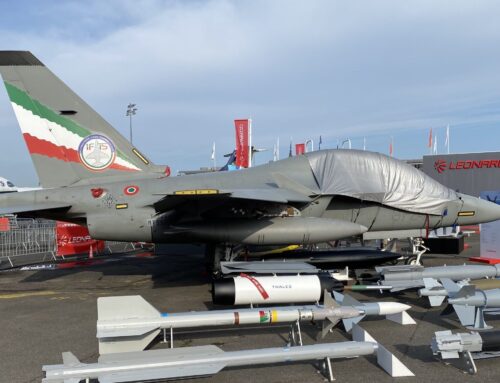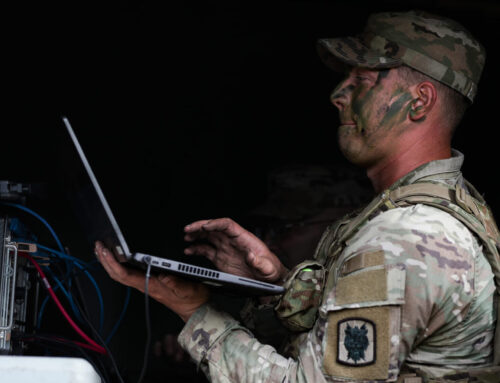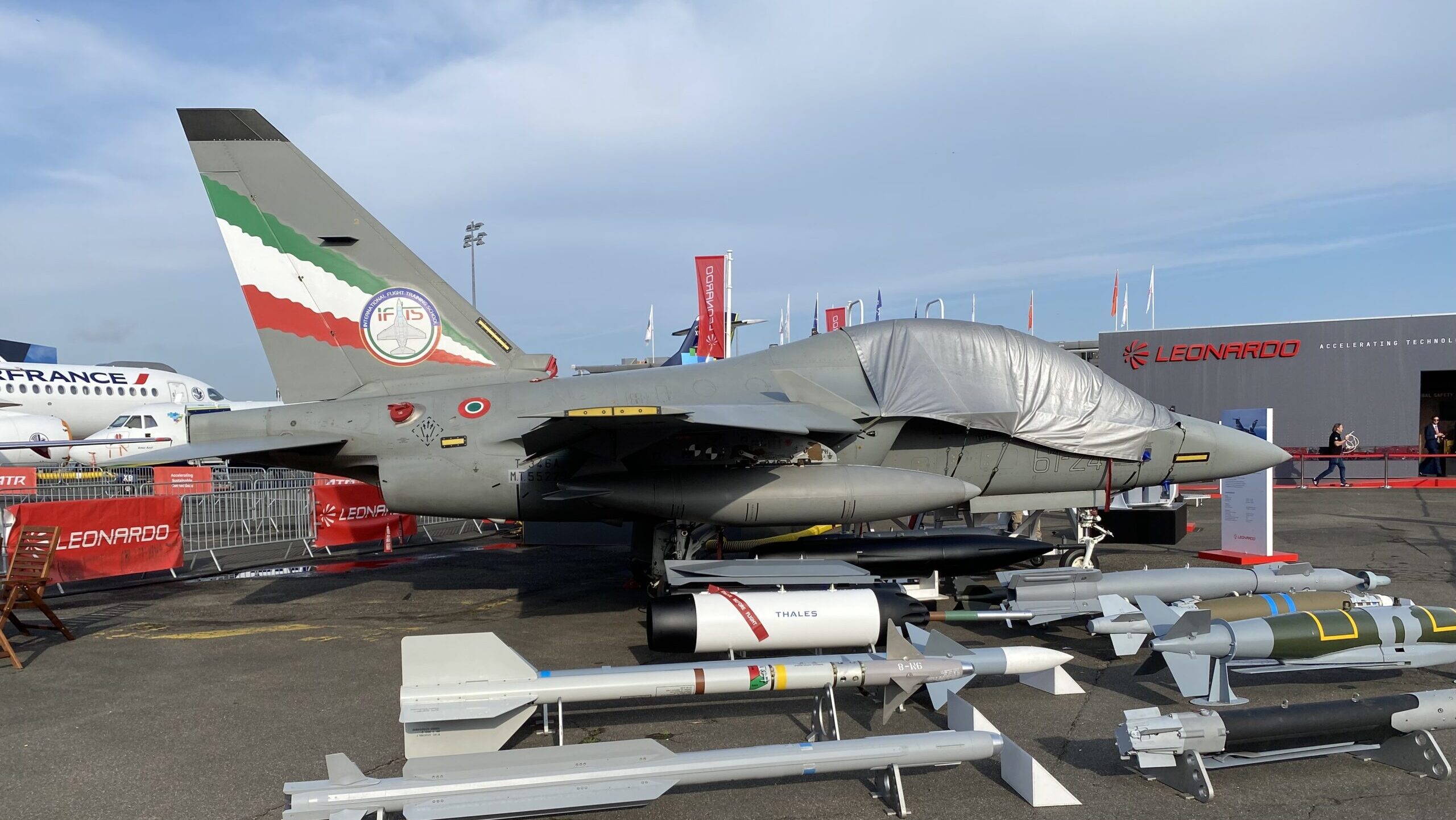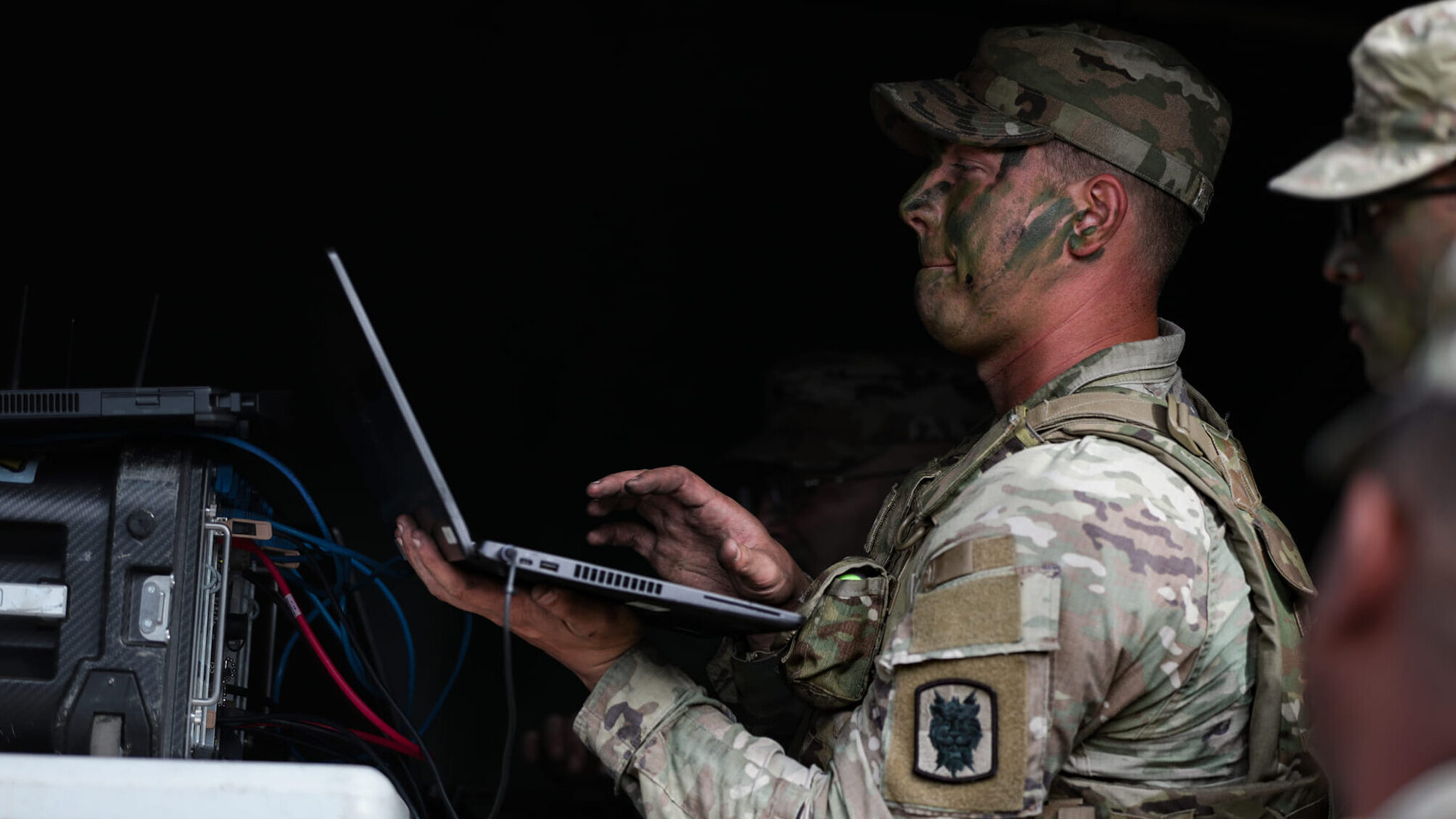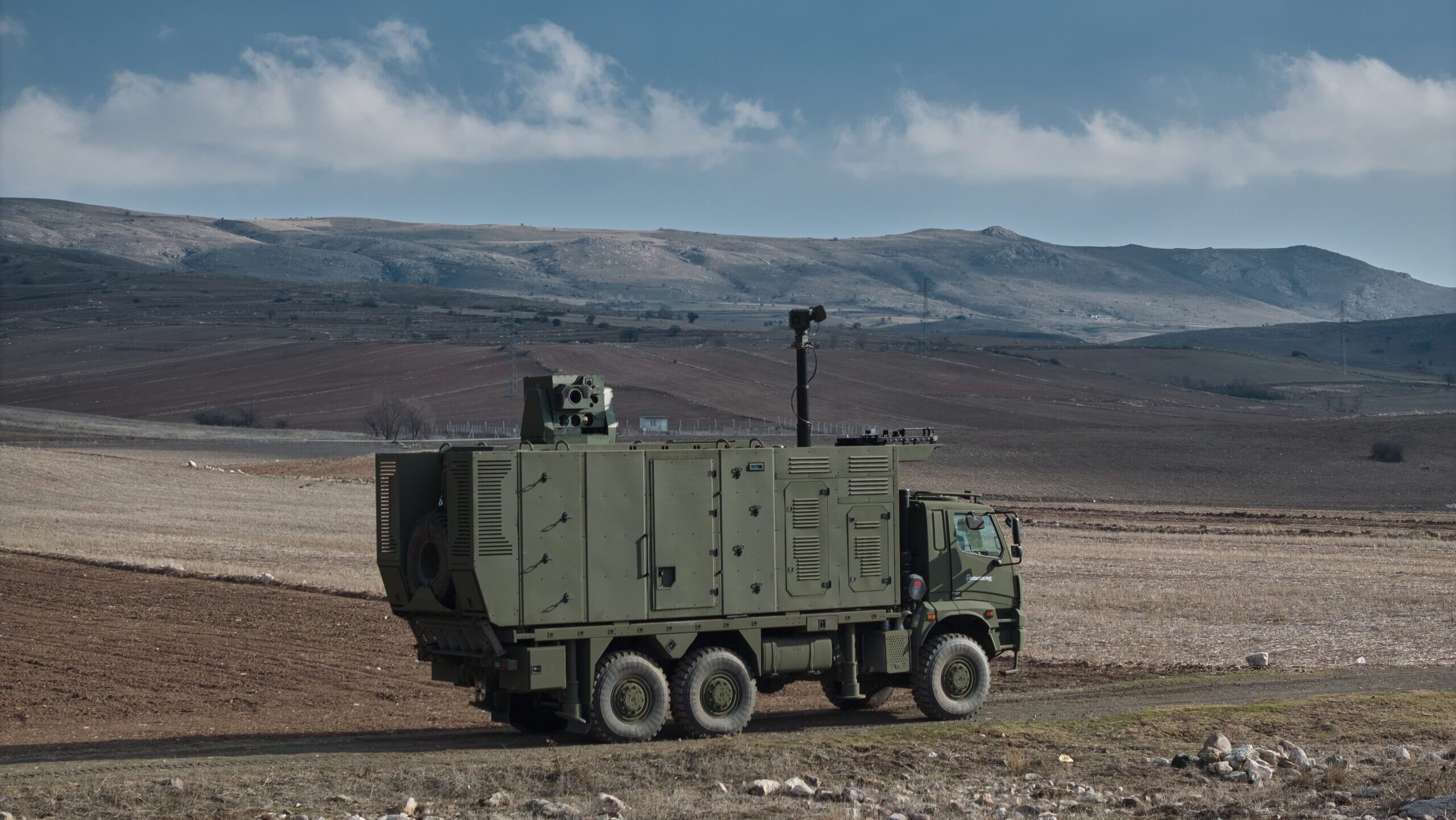Ensign Hunter Riportella relays information from the bridge aboard the Arleigh Burke-class guided-missile destroyer USS Mason (DDG 87) during a vertical replenishment with the Nimitz-class aircraft carrier USS Dwight D. Eisenhower (CVN 69) while the ships operate in support of Operation Prosperity Guardian (OPG) in the Red Sea, Jan. 8. (U.S. Navy photo by Mass Communication Specialist 1st Class Chris Krucke)
BEIRUT — Beginning in November 2023, the Yemen-based Houthi rebel group began launching missile, drone and even unmanned surface vessel attacks against commercial shipping in what the group said was common cause with Hamas’s attack on Israel.
By endangering Red Sea transit, the Houthis, officially called Ansar Allah or supporters of God, struck at a vital economic waterway host to approximately 15 percent of global maritime trade. Ships were presented with a bitter choice: Either to sail the Suez Canal-Red Sea-Bab El Mandeb Strait route under threat of a fatal incident, or reroute through Gibraltar all around Africa via Cape of Good Hope, and add up to two weeks to their journey.
Responding to the dilemma, a host of nations have since sent their own military ships to the waterway, most in an effort to protect commercial vessels there. But they’re not all working together.
In fact there are several overlapping military missions with names like Prosperity Guardian, Aspides and Poseidon Archer, with dozens of nations participating — or pointedly not participating — depending on who’s in charge and what the end goal of the mission is.
For now, the fractured effort is partly working. “Commercial shipping, while not at pre-Oct. 7 levels, is still about 70 percent of the normally expected merchant traffic normally observed,” a US defense official told Breaking Defense.
But with so many military vessels operating in the same strategic waterway, things are getting confusing — enough so that a friendly fire incident nearly took out an American drone not long ago.
In an effort to untangle the operational mess, here’s a guide to who’s doing what there, and why:
A map of alternate shipping routes. (Getty graphic)
Operation Prosperity Guardian
The first multinational protection initiative was Operation Prosperity Guardian, announced by US Secretary of Defense Lloyd Austin in December as a “multinational security initiative under the umbrella of the Combined Maritime Forces” of 10 countries: the US, the United Kingdom, Bahrain, Canada, France, Italy, Netherlands, Norway, Seychelles and Spain.
Three days later, Pentagon Press Secretary Pat Ryder said as many as 20 nations had said they would back the initiative, though some of the original nations, like Spain and Italy, later put out public statements that appeared to distance themselves from it. On Jan. 9 Singapore and Sri Lanka joined the operation.
A key quality of Prosperity Guardian is that it is wholly defensive in nature — knocking Houthi missiles and drones out of the sky, often. That appears to be one reason so many foreign nations have signed on to support, if the next operation is any indication.
Operation Poseidon Archer
Meanwhile, a more aggressive approach was taken by US and the United Kingdom. Dubbed Operation Poseidon Archer, the two countries have launched a series of military strikes on Houthi sites in Yemen, starting on Jan. 11, with support from Australia, Bahrain, Canada and the Netherlands. Subsequent strikes have included “support” from other nations, though the US and UK have not said what that support entails.
This operation is more controversial in the eyes of some countries and notably lacked public support from many European nations friendly with the US. Russia and Iran, predictably, condemned the strikes, while China said “that the attacks on Yemen did not stop at the destruction of facilities but further escalated tensions in the region.”
Though US President Joe Biden acknowledged the initial strikes haven’t stopped Houthi aggression, US officials have defended the offensive stance.
“Houthi militants have attacked or threatened US Navy and commercial vessels 99 times since Nov. 19,” Pentagon spokesperson Maj. Pete Nguyen told Breaking Defense.
Nguyen said the US “and partners” conducted “four combined strikes on Jan. 11, Jan. 22, Feb. 3, and Feb. 24” in addition to 44 “self-defense strikes.”
He said that the “combined strikes and self-defense strikes have destroyed over 150 missiles and launchers, and also storage and support buildings, UAV storage buildings, communication buildings, underground storage facilities, and UAV ground stations.”
EUNAVFOR Operation Aspides
In what analysts saw as bit of a rebuff to the US-led efforts, on Feb. 19 the European Council announced its own defense multi-national mission in the Red Sea: EUNAVFOR Aspides.
“Operation ASPIDES will ensure an EU naval presence in the area where numerous Houthi attacks have targeted international commercial vessels since October 2023,” the EU said in its announcement. “In close cooperation with like-minded international partners, ASPIDES will contribute to safeguard maritime security and ensure freedom of navigation, especially for merchant and commercial vessels. Within its defensive mandate, the operation will provide maritime situational awareness, accompany vessels, and protect them against possible multi-domain attacks at sea.”
That mission reportedly includes American allies Belgium, Denmark, France, Germany, Greece, Italy, and Spain, begging the question: Why not just participate in the already established US-led Prosperity Guardian?
David Des Roches, associate professor at the Near East South Asia Center for Security Studies, previously told Breaking Defense he believed the “EU is determined to forge its own identity in the military realm distinct from NATO, which it sees as US-dominated.”
Similarly, an analysis published by the Washington-based think tank Atlantic Council says that “[w]hile several European countries continue cooperating with Prosperity Guardian, the EU operation was set up as a sign of dissociation from the US-led operation against the Houthis, which some European governments perceive as escalatory in the fragile and tense broader regional context.”
It also said European nations may be more effective in their efforts absent US leadership. “[T]here might be real value in the current European approach, for regional partners as much as for the United States,” the analystss wrote. “With a longstanding naval, military, and diplomatic presence around the Gulf of Aden, Europe has credentials and legitimacy to engage regional players more inclusively.”
Officials in both operations said they would cooperate and coordinate with each other, but an incident in late February illustrated the risks of disparate missions when a German frigate mistakenly shot twice at a US-operated MQ-9B UAV.
“We can confirm that a U.S. MQ-9 Unmanned Aerial Vehicle was targeted in the Red Sea Feb. 27,” a defense official told Breaking Defense. “The UAV did not receive damage and continued its mission. CENTCOM is in close coordination with the EU and Operation Aspides to investigate the circumstances that led to this event and to ensure safe deconfliction of airspace. Operation Prosperity Guardian and Operation Aspides continue to operate alongside each other as we continue our mission to ensure freedom of navigation.”
As of this week, the official assured to Breaking Defense that he was not tracking any other incidents of miscommunication between the two operations.
“We are in close coordination with EU and Aspides leadership to ensure we coordinate defensive operations in the Red Sea between OPG [Operation Prosperity Guardian] and Aspides. We’ve done this before in other operations, and being like-minded nations, we will work together and work together well,” he said.
Where are the Gulf states?
With the influx of foreign ships to the region, only one Gulf nation is publicly and actively participating in any of the aforementioned operations: Bahrain in Prosperity Guardian.
Although Red Sea trouble, and the Houthi threat especially, directly impact the Kingdom of Saudi Arabia (KSA) and the United Arab Emirates (UAE), both sat out the security missions. While the two monarchies have not commented publicly, analysts told Breaking Defense earlier this year that it is likely because they don’t want to be seen as backing Israel for its war in Gaza, and it could be the latest sign of a growing rift between the Gulf nations and Washington.
“Contemporary US foreign policy and its recent defense coalitions and initiatives have placed the national security interests of major historical Gulf allies like KSA and the UAE at a lower priority in favor of regional rivals and their proxies,” Bahraini strategic analyst Yusuf Mubarak told Breaking Defense. “[As such] recent Houthi aggression against the global maritime movement is an expected outcome.”
And Then There’s China
At any given time, between four and eight US-led coalition vessels are in the region to secure the commercial maritime traffic, according to the US defense official. But it’s reportedly not the only superpower in the region.
Though public reports indicate the Houthis are making a pointed effort not to target Chinese ships, Chinese state media has reported that Beijing has sent the People’s Liberation Army Navy’s 46th fleet to the Middle East “to take over an escort mission from the 45th naval fleet in the Gulf of Aden and the waters off Somalia,” according to Chinese News Agency Xinhua.
“Basically all countries have vested interests in Red Sea security given how critical this body of water is to international trade. China is no exception,” Giorgio Cafiero, CEO of Gulf State Analytics, a US-based consulting firm, told Breaking Defense.
He said China is unlikely to participate in the US-led security operation, as China does not want to support what it sees as US hegemony. And joining Prosperity Guardian could risk “sending a message out about China being aligned with the US” in terms of supporting Israel in the Gaza conflict.
“The leadership is very keen to relay a narrative to the Arab-Islamic world and, more broadly, the Global South, that China is a defender of the Palestinian cause. Also, it appears that Chinese vessels have immunity in the sense that [the Houthis are] not waging maritime attacks against them, therefore Beijing does not necessarily have any huge incentive to work with the West in terms of efforts to deter the Houthis from engaging in more of this disruptive behavior,” Cafiero said.
Breaking Defense’s Ashley Roque contributed reporting from Washington, D.C.



